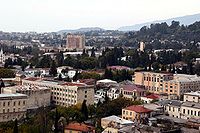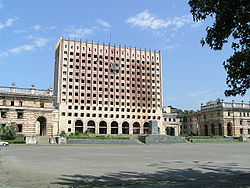
Government of Abkhazia-in-exile
Encyclopedia
The Government of the Autonomous Republic of Abkhazia is an administration recognized by Georgia
as the legal government-in-exile
of Abkhazia
. Abkhazia that has been de facto independent of Georgia though with very little international recognition since the early 1990s. This pro-Georgian government maintained a foothold on Abkhazian territory until it was forced into exile by fighting in August 2008. Giorgi Baramia
, elected in June 2009, is the current head of the government-in-exile.
After the War in Abkhazia
(1992–1993) Georgia proposed five-party talks involving the Government of the Autonomous Republic, the government of the de facto
authorities of Abkhazia, and the government of Georgia, along with Russia and the UN as interested parties, in order to settle the final status of Abkhazia within the framework of the Georgian state. The Abkhaz side wanted assurances that Georgia would not try to solve the issue by force of arms before being a party to the talks.
Between September 2006 and July 2008, the Georgian recognized government was headquartered in Upper Abkhazia
. However it was forced out of all of Abkhazia in August 2008 during the 2008 South Ossetia War
by the Abkhazian armed forces
. Upper Abkhazia
is a territory that has population of c. 2,000 (1-1.5% of Abkhazia's post-war population) and is centered on the upper Kodori Valley
(roughly 17% of the territory of the former Abkhaz ASSR). The government-in-exile is also partly responsible for the affairs of some 250,000 internally displaced persons who were forced to leave Abkhazia following the War in Abkhazia and the ethnic cleansing of Georgians
that followed.
 During the War in Abkhazia, the Government of the Autonomous Republic of Abkhazia, then called the "Council of Ministers of Abkhazia", left Abkhazia after the Abkhaz separatist forces took control of the region’s capital Sukhumi
During the War in Abkhazia, the Government of the Autonomous Republic of Abkhazia, then called the "Council of Ministers of Abkhazia", left Abkhazia after the Abkhaz separatist forces took control of the region’s capital Sukhumi
after heavy fighting on September 27, 1993, leading to the Sukhumi Massacre
, in which several members of the Abkhazian government of that time, including its chairman Zhiuli Shartava
, were executed by the rebels. The Council of Ministers relocated to Georgia’s capital Tbilisi
, where it operated as the Government of Abkhazia in exile for almost 13 years. During this period, the Government of Abkhazia in exile, led by Tamaz Nadareishvili
, was known for a hard-line stance towards the Abkhaz problem and frequently voiced their opinion that the solution to the conflict can only be attained through Georgia's military response to secessionism. Later, Nadareishvili's administration was implicated in some internal controversies and had not taken an active part in the politics of Abkhazia until a new chairman, Irakli Alasania
, was appointed by President of Georgia
, Mikheil Saakashvili
, his envoy in the peace talks over Abkhazia.
 Amid the 2006 Georgian police operation
Amid the 2006 Georgian police operation
in Abkhazia's Kodori Gorge, in which a local militia, led by the defiant warlord
Emzar Kvitsiani
, had been largely disarmed, and the constitutional order restored in the area, President Saakashvili announced, on July 27, 2006, that the authorities had decided to establish the Tbilisi-based Abkhazian government-in-exile in the Kodori Gorge (Upper Abkhazia):
During the 2008 War in Ossetia, the Republic of Abkhazia joined forces with the Ossetians and opened a second front against Georgia. During the Battle of the Kodori Valley
Abkhazian forces loyal to the Government of the Republic of Abkhazia
pushed the Government of the Autonomous Republic of Abkhazia out of the region of Abkhazia. Sergei Bagapsh
, President of the Government of the Republic of Abkhazia
said in an address to the Abkhazian people that “the jurisdiction of the Abkhaz state has been restored in the upper Kodori Gorge.”
|Giorgi Baramia
|
|June 2009
|-
|Chairman of the Supreme Council
|Elguja Gvazava
|Abkhazeti
|June 2009
|-
|Deputy of Supreme Council
|Tamaz Khubua
|Abkhazeti
|June 2009
|}
Georgia (country)
Georgia is a sovereign state in the Caucasus region of Eurasia. Located at the crossroads of Western Asia and Eastern Europe, it is bounded to the west by the Black Sea, to the north by Russia, to the southwest by Turkey, to the south by Armenia, and to the southeast by Azerbaijan. The capital of...
as the legal government-in-exile
Government in exile
A government in exile is a political group that claims to be a country's legitimate government, but for various reasons is unable to exercise its legal power, and instead resides in a foreign country. Governments in exile usually operate under the assumption that they will one day return to their...
of Abkhazia
Abkhazia
Abkhazia is a disputed political entity on the eastern coast of the Black Sea and the south-western flank of the Caucasus.Abkhazia considers itself an independent state, called the Republic of Abkhazia or Apsny...
. Abkhazia that has been de facto independent of Georgia though with very little international recognition since the early 1990s. This pro-Georgian government maintained a foothold on Abkhazian territory until it was forced into exile by fighting in August 2008. Giorgi Baramia
Giorgi Baramia
Giorgi Baramia is a Georgian diplomat and the chairman of the Government of the Autonomous Republic of Abkhazia since June 2009....
, elected in June 2009, is the current head of the government-in-exile.
After the War in Abkhazia
War in Abkhazia (1992–1993)
The War in Abkhazia from 1992 to 1993 was waged chiefly between Georgian government forces on one side and Abkhaz separatist forces supporting independence of Abkhazia from Georgia on the other side. Ethnic Georgians, who lived in Abkhazia fought largely on the side of Georgian government forces...
(1992–1993) Georgia proposed five-party talks involving the Government of the Autonomous Republic, the government of the de facto
De facto
De facto is a Latin expression that means "concerning fact." In law, it often means "in practice but not necessarily ordained by law" or "in practice or actuality, but not officially established." It is commonly used in contrast to de jure when referring to matters of law, governance, or...
authorities of Abkhazia, and the government of Georgia, along with Russia and the UN as interested parties, in order to settle the final status of Abkhazia within the framework of the Georgian state. The Abkhaz side wanted assurances that Georgia would not try to solve the issue by force of arms before being a party to the talks.
Between September 2006 and July 2008, the Georgian recognized government was headquartered in Upper Abkhazia
Upper Abkhazia
Upper Abkhazia is a term introduced in 2006, to denote the northeastern part of the disputed territory of Abkhazia, that had remained under Georgian control after the 1992 - 1993 War in Abkhazia. From September 2006 until August 2008 its main village, Chkhalta, hosted the Government of the...
. However it was forced out of all of Abkhazia in August 2008 during the 2008 South Ossetia War
2008 South Ossetia war
The 2008 South Ossetia War or Russo-Georgian War was an armed conflict in August 2008 between Georgia on one side, and Russia and separatist governments of South Ossetia and Abkhazia on the other....
by the Abkhazian armed forces
Military of Abkhazia
The Abkhazian Armed Forces is the military of Abkhazia.The Ministry of Defence and the General Staff of the Abkhazian armed forced were officially created on 12 October 1992, after the outbreak of the 1992-1993 war with Georgia. The basis of the armed forces was formed by the ethnic Abkhaz National...
. Upper Abkhazia
Upper Abkhazia
Upper Abkhazia is a term introduced in 2006, to denote the northeastern part of the disputed territory of Abkhazia, that had remained under Georgian control after the 1992 - 1993 War in Abkhazia. From September 2006 until August 2008 its main village, Chkhalta, hosted the Government of the...
is a territory that has population of c. 2,000 (1-1.5% of Abkhazia's post-war population) and is centered on the upper Kodori Valley
Kodori Valley
The Kodori Valley is a river valley in Abkhazia, Georgia's breakaway autonomous republic. The valley's upper part, populated by Svans, was the only corner of the post-1993 Abkhazia, directly controlled by the central Georgian government, which officially styles the area as Upper Abkhazia...
(roughly 17% of the territory of the former Abkhaz ASSR). The government-in-exile is also partly responsible for the affairs of some 250,000 internally displaced persons who were forced to leave Abkhazia following the War in Abkhazia and the ethnic cleansing of Georgians
Ethnic cleansing of Georgians in Abkhazia
The Ethnic Cleansing of Georgians in Abkhazia, also known as the Massacres of Georgians in Abkhazia and Genocide of Georgians in Abkhazia — refers to ethnic cleansing, massacres and forced mass expulsion of thousands of ethnic Georgians living in Abkhazia during the Georgian-Abkhaz conflict...
that followed.
History

Sukhumi
Sukhumi is the capital of Abkhazia, a disputed region on the Black Sea coast. The city suffered heavily during the Georgian-Abkhaz conflict in the early 1990s.-Naming:...
after heavy fighting on September 27, 1993, leading to the Sukhumi Massacre
Sukhumi Massacre
The Sukhumi massacre took place on September 27, 1993, during and after the fall of Sukhumi into separatist hands in the course of the War in Abkhazia. It was perpetrated against Georgian civilians of Sukhumi, mainly by militia forces of Abkhaz separatists, their North Caucasian and Russian allies...
, in which several members of the Abkhazian government of that time, including its chairman Zhiuli Shartava
Zhiuli Shartava
Zhiuli Shartava was a Georgian politician and the Head of the Council of Ministers of the Autonomous Republic of Abkhazia who was killed by Abkhaz militants during the ethnic cleansing of Georgians in Abkhazia in 1993....
, were executed by the rebels. The Council of Ministers relocated to Georgia’s capital Tbilisi
Tbilisi
Tbilisi is the capital and the largest city of Georgia, lying on the banks of the Mt'k'vari River. The name is derived from an early Georgian form T'pilisi and it was officially known as Tiflis until 1936...
, where it operated as the Government of Abkhazia in exile for almost 13 years. During this period, the Government of Abkhazia in exile, led by Tamaz Nadareishvili
Tamaz Nadareishvili
Tamaz Nadareishvili was a Georgian politician who served as head of the Council of Ministers of Abkhazia, a government-in-exile for the breakaway province....
, was known for a hard-line stance towards the Abkhaz problem and frequently voiced their opinion that the solution to the conflict can only be attained through Georgia's military response to secessionism. Later, Nadareishvili's administration was implicated in some internal controversies and had not taken an active part in the politics of Abkhazia until a new chairman, Irakli Alasania
Irakli Alasania
Irakli Alasania is a Georgian politician and former diplomat. He was Georgia’s Ambassador to the United Nations from September 11, 2006, until December 4, 2008. His previous assignments include Chairman of the Government of Abkhazia and the President of Georgia’s aide in the Georgian-Abkhaz talks...
, was appointed by President of Georgia
President of Georgia
The President of Georgia is the head of state, supreme commander-in-chief and holder of the highest office within the Government of Georgia. Executive power is split between the President and the Prime Minister, who is the head of government...
, Mikheil Saakashvili
Mikheil Saakashvili
Mikheil Saakashvili is a Georgian politician, the third and current President of Georgia and leader of the United National Movement Party.Involved in the national politics since 1995, Saakashvili became president on 25 January 2004 after President Eduard Shevardnadze resigned in a November 2003...
, his envoy in the peace talks over Abkhazia.

2006 Kodori crisis
The 2006 Kodori crisis erupted in late July 2006 in Abkhazia's Kodori Gorge, when a local militia leader declared his opposition to the Government of Georgia, which sent police forces to disarm the rebels...
in Abkhazia's Kodori Gorge, in which a local militia, led by the defiant warlord
Warlord
A warlord is a person with power who has both military and civil control over a subnational area due to armed forces loyal to the warlord and not to a central authority. The term can also mean one who espouses the ideal that war is necessary, and has the means and authority to engage in war...
Emzar Kvitsiani
Emzar Kvitsiani
Emzar Kvitsiani was a Georgian presidential representative in the Kodori Gorge.- 2006 Kodori crisis :...
, had been largely disarmed, and the constitutional order restored in the area, President Saakashvili announced, on July 27, 2006, that the authorities had decided to establish the Tbilisi-based Abkhazian government-in-exile in the Kodori Gorge (Upper Abkhazia):
During the 2008 War in Ossetia, the Republic of Abkhazia joined forces with the Ossetians and opened a second front against Georgia. During the Battle of the Kodori Valley
Battle of the Kodori Valley
The Battle of Kodori Valley was a military operation in the Upper Kodori Valley, during the 2008 South Ossetia war, the only part of Abkhazia, which remained under Georgian control after the War in Abkhazia from 1992 to 1993. Hostilities started, during the 2008 South Ossetia war, the Abkhazian...
Abkhazian forces loyal to the Government of the Republic of Abkhazia
Government of the Republic of Abkhazia
The Government of the Republic of Abkhazia is the de facto political leadership of the partially recognised Republic of Abkhazia.-Executive branch:...
pushed the Government of the Autonomous Republic of Abkhazia out of the region of Abkhazia. Sergei Bagapsh
Sergei Bagapsh
Sergei Uasyl-ipa Bagapsh was the second President of the Republic of Abkhazia. He was Prime Minister from 1997 to 1999 and was later elected as President in 2005. He was re-elected in the 2009 presidential election...
, President of the Government of the Republic of Abkhazia
Government of the Republic of Abkhazia
The Government of the Republic of Abkhazia is the de facto political leadership of the partially recognised Republic of Abkhazia.-Executive branch:...
said in an address to the Abkhazian people that “the jurisdiction of the Abkhaz state has been restored in the upper Kodori Gorge.”
Heads of the Government
- Tamaz NadareishviliTamaz NadareishviliTamaz Nadareishvili was a Georgian politician who served as head of the Council of Ministers of Abkhazia, a government-in-exile for the breakaway province....
, September 1993 – March 16, 2004 - Londer TsaavaLonder TsaavaLonder Tsaava was the chairman of the Cabinet of Ministers in Exile, which forms part of the Georgian government-in-exile now based in Kodori, Georgia. In this capacity, he served as the government-in-exile's second highest ranking official, and also had a period as de facto leader.He has been a...
, March 16, 2004 – September 30, 2004 - Irakli AlasaniaIrakli AlasaniaIrakli Alasania is a Georgian politician and former diplomat. He was Georgia’s Ambassador to the United Nations from September 11, 2006, until December 4, 2008. His previous assignments include Chairman of the Government of Abkhazia and the President of Georgia’s aide in the Georgian-Abkhaz talks...
, September 30, 2004 – April 24, 2006 - Malkhaz AkishbaiaMalkhaz AkishbaiaMalkhaz Akishbaia is an Abkhaz politician and the Chairman of Council of Ministers of the de jure Government of the Autonomous Republic of Abkhazia from March 2006 to June 2009....
, April 24, 2006 – June 11, 2009 - Giorgi BaramiaGiorgi BaramiaGiorgi Baramia is a Georgian diplomat and the chairman of the Government of the Autonomous Republic of Abkhazia since June 2009....
, since June 11, 2009
Executive branch
!align=left|Chairman of Cabinet of Ministers|Giorgi Baramia
Giorgi Baramia
Giorgi Baramia is a Georgian diplomat and the chairman of the Government of the Autonomous Republic of Abkhazia since June 2009....
|
|June 2009
|-
|Chairman of the Supreme Council
|Elguja Gvazava
Elguja Gvazava
Elguja "Gia" Gvazava is a Georgian politician. Being a native of Georgia's autonomous republic of Abkhazia and a member of the local legislature since 1991, Gvazava was forced, along with most of the region's Georgian population, to flee the secessionist victory in Abkhazia in 1993...
|Abkhazeti
|June 2009
|-
|Deputy of Supreme Council
|Tamaz Khubua
|Abkhazeti
|June 2009
|}

